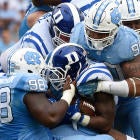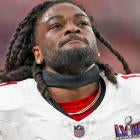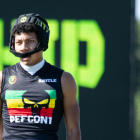CHARLOTTE -- North Carolina's 2015 season was an awakening. Up-tempo offensive attacks thrive when they're in rhythm, and after a mistake-filled loss to South Carolina in the season opener, the Tar Heels re-adjusted and caught fire with a school-record 11 victories on the way to winning the ACC's Coastal Division for the first time.
Recruiting wins had paid off, and UNC had the personnel ready to take Larry Fedora's offense to levels no one had previously seen in Chapel Hill. The 2015 team set 62 school records on offense, averaged 40.7 points and 486.9 yards per game.
On the other side of the ball, defensive coordinator Gene Chizik was named a Broyles Award finalist for crafting a scheme that complemented the high-octane attack. North Carolina was one of the most efficient teams in college football, ranking just behind Ohio State and ahead of Oklahoma with the second-best points per play margin in the country.
Chizik rightly gets a lot of credit for simplifying North Carolina's scheme in his first year back in coaching. Gifted secondary players like Des Lawrence and M.J. Stewart thrived in read-and-react roles, leading the way for a unit that ranked tied for first in the ACC in interceptions (17) and turnovers created (26). Lawrence said they take pride in creating that disruption for the opposition, and the confidence Chizik instills in them "allows us to make plays on the field."
"He's the one that will tell you it's not a coach's game, it's a players game," Lawrence said. "Saturday is just our day to show the world what we're made of."
North Carolina, which checks in at No. 23 in the CBS Sports 128 preseason rankings, gets its first chance to do that is Sept. 3 in a meeting against Georgia in the Chick-fil-A Kickoff Game in Atlanta. The schedule also includes a trip to Tallahassee, Florida, to play Florida State and a game at Miami that carries a little extra buzz with Mark Richt on the sideline.
Offensively, North Carolina is on par with each of those big-name opponents. Quarterback Mitch Trubisky, running back Elijah Hood and wide receiver Ryan Switzer lead a unit that has an experienced line and skill position talent for days. They'll be able to put up points and yards against almost anyone, but can the defense continue to balance its "bend-but-don't break" style?
The Tar Heels defense ranked last in the ACC in total rushing yards allowed and next to last in total offensive yards allowed. None of it really seemed to be an issue because the team did a great job forcing turnovers and coming up with stops in the red zone. But in its only two games against ranked opponents (both losses), the Tar Heels gave up 1,364 yards, good for 22.3 percent of its season total across 14 games.
Fedora, sporting a new beard looking as comfortable as he as since arriving in Chapel Hill in 2012, explained his stance on these antiquated defensive statistics.

"We don't put a lot of stock in yards allowed anymore," Fedora said. "Total yards on defense, that's not even a stat we pay attention to. The most important stat is scoring defense. Now, there are other stats that play into that role, like turnovers, but scoring defense is number one.
"If you don't let them get in the end zone, it doesn't matter how many times you let them run up and down the field."
Fedora may not look at total yards, but it's impossible to ignore the stats in the final performance of that memorable 2015 campaign. Baylor, down to its backup backup quarterback (actually five different players played "quarterback" in the game) and without its top running back and wide receiver, ran for a bowl-record 645 yards in a 49-38 win in the Russell Athletic Bowl. Art and Kendal Briles found a weakness in the defense and exploited it over and over. Explosive plays? There were plenty. Turnovers? Only one forced and two given up. In this case, it's probably better to stick to Fedora's mantra of not looking at total yards because the final tally could be deemed not safe for work.
North Carolina's defense won't look at yards, but it remembers results. The Clemson and Baylor losses are name-checked by players and have become fuel for the 2016 campaign. Another year with Chizik means even more understanding for the base system and therefore even more chances to be aggressive in an effort to get the ball back to the Tar Heels' high-flying offense. North Carolina won 11 games, sure, but it fell just short in the ones that got the most attention.
There is no doubt that UNC will put numbers on the board in 2016, but it'll take a stellar performance on the defensive side of the ball -- particularly against running backs like Nick Chubb, Dalvin Cook and James Conner -- to capture the ACC's Coastal Division for the second straight season.
The responsibility starts up front with Naz Long and surging sophomore defensive tackle Jalen Dalton. The run fits have to be consistent at the second level, where Andre Smith steps into the shoes of Jeff Schoettmer at middle linebacker. The secondary has to be ready to read and react to limit the explosive plays.
Now nationally ranked and no longer a sleeper, North Carolina's defense prepares for some of it's toughest challenges since Chizik's arrival. Fedora may not care for antiquated defensive stats, but there's a plenty of reasons to believe that improving some of those numbers, particularly against ranked opponents, will be necessary for big-time success in 2016.





















